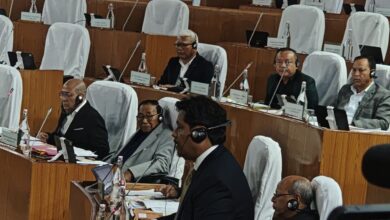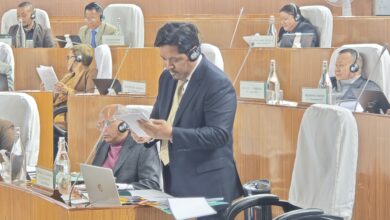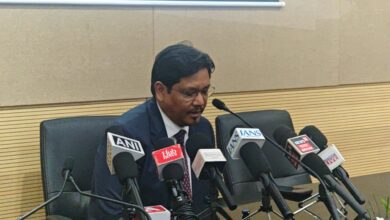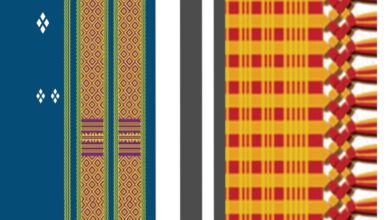Ichamati residents caught in a vortex of violence, fear & injustice
Locals say despite Ichamati's history of violence, police didn't inform about March 27 meeting
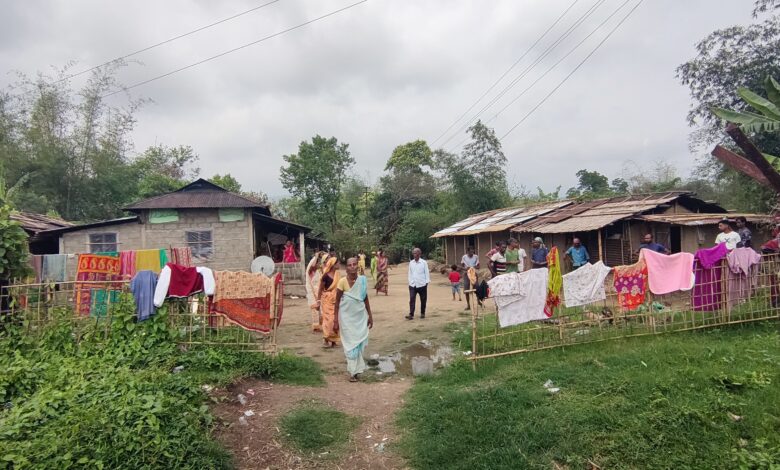
Ichamati/Shillong: Insaf chahiye, insaf (justice needed ), shouted the women who gathered at the residences of two poor labourers at Ichamati Dharom Basti, who were the victims of violence on March 27. The residents are living in fear after the twin murders.
The worst affected are the daily wage earners and students who are worried about their safety and security.
The quaint village on the Indo-Bangladesh border has turned into a conflict zone with back-to-back violent incidents since 2020.
The residents criticised the authorities for not alerting them to stay at home when the anti-Citizenship Amendment Act (CAA) meeting by the KSU was held on March 27 followed by the killing of two young workers from the village.
During a visit to the area on March 31, locals narrated their plight. “If we had known that the meeting would be held, we would not have ventured out,” many of them told Meghalaya Monitor.
According to the residents, police personnel were present during the meeting but failed to act when violence was perpetrated. They also complained that no officials visited the families after the incident.
East Khasi Hills SP Rituraj Ravi said by the time his men reached the spot of the anti-CAA meeting, the crowd had already dispersed.
Sources said the only possibility for such a flare-up was intelligence failure or the authorities took it for granted that no untoward incident would happen. In either case, there was a lapse and given the history of violence, the Home (Police) Department should have been more alert as no permission was taken for the meeting at a time when the election model code of conduct was in force, the sources added.
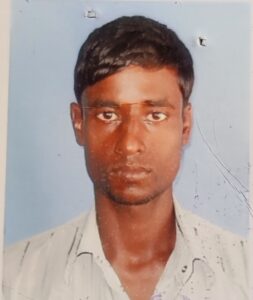
Though the police arrested two KSU members based on evidence, the KSU ruled out its role in the killing of two labourers in Ichamati and Dalda by saying that they only torched the copies of the CAA rules on March 27 and dispersed.
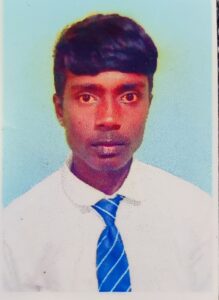
The government has ordered a magisterial probe but the villagers say nobody turned up for inquiry. “Only the police came to hand over the bodies. We want officials to visit so that they can ensure our safety and security,” a villager said.
As the magisterial probe may not yield the desired result, the residents wanted a high-level probe into the matter.
The Vishwa Hindu Parishad, Delhi, has already sought the intervention of the President of India for a CBI or an NIA probe into the matter but the KSU leadership has criticised the move.
Family of late Sujit Dutta (28)
The family was still in shock when Meghalaya Monitor visited them.
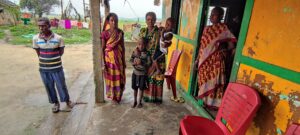
Many neighbours, especially women, gathered at the residence of Dutta expressing anger over the incident.
Dutta, a daily wage earner, was earning his living by loading limestones in vehicles. His wife, Manjuri Dutta (25), who is pregnant, said with the death of the sole bread earner, the family is at a loss as her elder son is only seven years old and the second one is four.
“It was Swapan Debnath from Kalibari who escaped and informed us that the criminals caught my brother at Dalda around 6 km away from Ichamati,” said Sushil, the brother of the deceased.
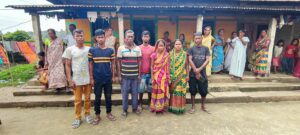
When visited, Swapan said two persons tried to attack them but he escaped while Sujit could not.
The plight of Adivasi family
The house of another victim from the Adivasi community, Insan Singh (24), whose body was found near the SBI office in Ichamati, is not far. A paddy field divides both the victims’ places. A large crowd had gathered at Singh’s residence on March 31. It was Singh’s shradh. His body was buried outside the house.
Singh, the eldest in the family, was a BA second-year student in Sohra. He worked at a nearby limestone quarry to help the family of six, including his three siblings, as his father was unwell.
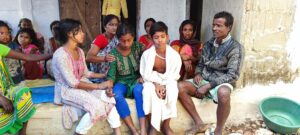
“My son would not have gone out for work on that day had the authorities informed us about the meeting,” Phulmoti Singh, the mother of the victim, said.
Anxiety for the future was visible on the face of the victim’s father Bono Singh who is compelled to shoulder more responsibility.
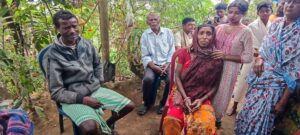
“My father had an accident many years ago in the limestone quarry, there he had injured his eyes and since then my brother was looking after us,” said Pinky, the younger sister of late Insan Singh.
According to Pinky, her brother wanted her to complete graduation so that she could get a job. “My brother sent me to Shillong to study. Our parents always used to worry about us, we are poor but my brother used to give us hope that I would get a job after the completion of my studies,” said Pinky, who is a Bcom first-year student at Shillong College. She could not write the first-semester examination that started on April 1.
Her younger brother is in Class IX and the younger sister, who appeared for the Matric examinations, is awaiting results.
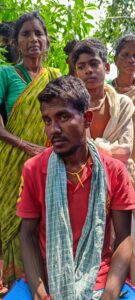
Compensation
Both families feel that the compensation of Rs 5 lakh each announced and granted by the government will not bring back those who are no more. What they need is safety and security in the area.
The government has already released Rs 5 lakh to each victim’s family and they accepted the amount but said that for the whole year, they cannot survive with the amount.
Mixed population
Ichamati under Mawlong Sirdarship has a mixed population of Adivasis, Bengalis, Nepalis, Hajongs, Rajbongshis, Garos and Khasis, besides members of other minor communities.
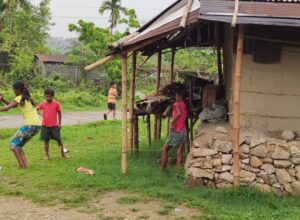
Historian JB Bhattacharjee said the nature of any border area is that it has a mixed population which lives and let others live.
During the British period, the village had a few residents but more people settled there after the partition of India and Pakistan and also after the formation of Bangladesh.
According to the 2011 census, 124 families are residing in Ichamati with a population of 627 persons but in the last 10 years, the number has increased. The 2011 data also states that the Schedule Tribe (ST) population is 27.43% and the Schedule Caste (SC) 0.32%.
Sohra Sub Divisional Officer (Civil) Saloni Verma said as per projected population in 2024, the number of male is 608 and female 530. The area is under Sohra Civil Sub Division.
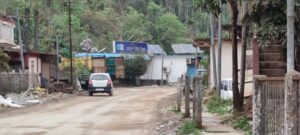
Locals mainly depend on limestone quarries and the agriculture fields for their livelihood. The agriculture fields are owned by the indigenous individuals and the villagers work for the land owners. While some residents have got land patta from Sirdar, others pay between Rs 2,000 and Rs 5,000 yearly as tax for the houses constructed by them.
Mawlong Sirdar Stephen Laloo admitted that the residents who are not indigenous have to pay ‘royalty’ as the land is under Mawlong Sirdarship.
As Ichamati, under Shella-Bholaganj Block, falls under the Sixth Schedule governed by the Khasi Hills Autonomous District Council (KHADC), CAA is completely exempted.
According to Bhattacharjee, Ichamati was already under the erstwhile United Khasi-Jaintia Hills District.
KHADC Chief Executive Member Pyniaid Sing Syiem said the CAA does not apply to Ichamati and only the European Ward and the Cantonment areas in Shillong are under the CAA.
In this context, the residents questioned why the anti-CAA meeting should be held in Ichamati.
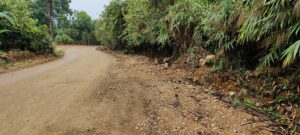
No civic amenities
Though administratively, Ichamati is under Shella Bholaganj Block, there are hardly any civic amenities and welfare schemes provided to the villagers.
The women in Ichamati expressed concern over the fact that they have to use unhygienic river water in the absence of piped water. The power supply is not regular. Though the village is on the Bangladesh border, ro thads are in a dilapidated stage. They also pointed out that the authorities concerned are not providing ration and health cards to them.
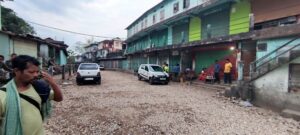
Many elderly widows with no one to take care of them came forward with a plea to provide widow pensions as well as old-age pensions . When contacted, Sohra Sub Divisional Officer Verma said she was aware of the difficulties faced by the villagers.
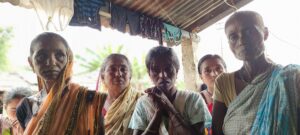
“Their concerns will have to be addressed by the block-level officers. I will call a meeting of the block-level officers to discuss the matter after the polls,” she said.
According to the SDO, the situation is gradually turning normal.
When pointed out that the residents are still in fear, she said, “The incident took place recently, so it will take a few more days for the situation to be completely normal but we’re trying our level best to restore normalcy.”
To a question on the deployment of CRPF personnel as demanded by the villagers, the SDO said whatever forces available with the administration would be used.
However, Ravi said the authorities were discussing whether to deploy the CRPF.
Bangladeshi tag
The residents here do not like to be called Bangladeshis. “We were born and brought up here in Ichamati, but we are often branded as Bangladeshis and they want us to go back to Bangladesh,” the villagers said.
According to the residents, if their elder generation had come to Ichamati from Bangladesh after partition and settled here, it is not their fault or the fault of the present generation. “At that time, why we were given shelter here and now why are we asked to go back,” they asked.
Historian Bhattacharjee said it is illegal to racially profile any community.
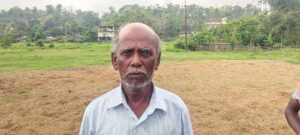
Pending case of Lurshai Hynniewta
Lurshai Hynniewta (35) was killed following a clash in the area during the anti-CAA protest on February 28, 2020, organised by the KSU. The rally had also raised the demand for ILP.
According to the villagers, at least 90 non-indigenous persons were arrested in connection with the incident.
Violence, curfew and ban on the internet followed the death of Hynniewta and the result was two more killings — Uphas Uddin was attacked in his house at Pyrken near Ichamati and Rupchand Dewan, a vegetable vendor from Barpeta district of Assam, was stabbed to death at Iewduh (Barabazar). Many people were injured in the stabbing incidents in the city.
“Police took away the sick and the old persons at night as part of interrogation,” the elderly women recollected when asked about the February 28 incident of 2020.
The KSU was recently annoyed after a raid at night at the residences of the two arrested KSU activists after the March 27 violent incident.
When contacted, the lawyer dealing with the Lurshai case said some accused got bail two years after they were lodged in Tura jail. “I think it is in the trial stage now,” he added.
“As the case is still pending, we are open for a CBI probe into the incident and whoever is guilty, let them be punished,” some elderly villagers said.
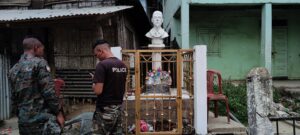
The KSU had installed a bust of Hynniewta at the centre of Ichamati town and commemorative meetings are held frequently. The villagers expressed concern that whenever meetings were held in front of the bust, there used to be violent incidents.
As tension in the area is far from over, the government and the stakeholders hope that the situation will improve after the April 19 Lok Sabha polls.


